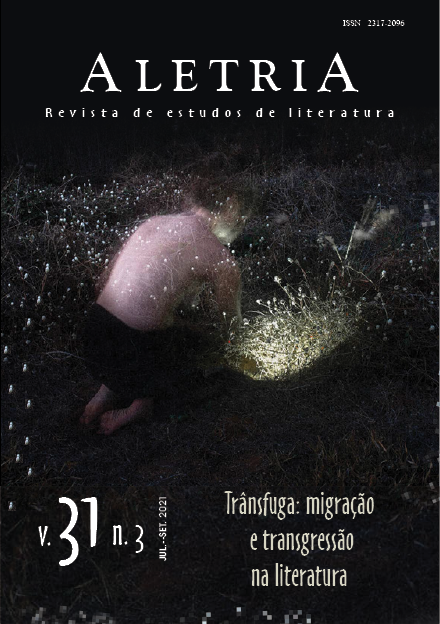Autoexílio e pátria literária em Los Eunucos Inmortales de Oswaldo Reynoso
DOI:
https://doi.org/10.35699/2317-2096.2021.26986Palavras-chave:
literatura peruana, exílio, pátria literária, literatura e sociedadeResumo
Este artigo discute os reflexos do autoexílio no livro Los Eunucos Inmortales (1995) do escritor peruano Oswaldo Reynoso. Considerando a hipótese defendida por Torres (2016) de que a prosa de Reynoso, após o exílio, pode ser lida desde uma segunda onda criativa, caracterizada pela linguagem poética que visa ao descobrimento da identidade, analisaram-se três inovações no romance: o paralelismo entre Lima e Pequim; a construção da imagem do estrangeiro; o viés antropológico adotado para se pensar pátria e identidade. Se anteriormente Reynoso buscava a liberdade a partir da crítica visceral ao capitalismo, agora muda-se o objeto de sua procura vital, desencadeada após a frustração do regime maoísta. Para o narrador, a liberdade, agora entendida como felicidade, passa a se encontrar na literatura e não na realidade, o que o leva a propor que sua identificação nacional não se alinha mais à pátria geográfica, mas à pátria literária.
Downloads
Referências
CÉSAR, Daisy. A contística de Sonia Coutinho e suas implicações identitárias. Caderno de Letras da UFF, Niterói, n. 36, p. 133-143, 1.sem. 2008.
ECO, Umberto. Interpretação e superinterpretação. São Paulo: Martins Fontes, 1993.
ESLAVA, Jorge. Oraciones del Cuerpo. In: REYNOSO, Oswaldo.Narraciones 1. Lima: Editorial Universidad Ricardo Palma, 2005. p. 9-22.
GABEIRA, Fernando. Notas sobre o exílio interior. O Globo, Rio deJaneiro, 22 fev. 2015. Segundo Caderno.
HEREDIA, Gladys Flores (org.). Oswaldo Reynoso: Los universosnarrativos I. Lima: Editorial San Marcos, 2013.
INDURSKY, Alexei Conte; CONTE, Bárbara de Souza. Trabalhopsíquico do exílio: o corpo à prova da transição. Ágora, Rio de Janeiro, v.18, n. 2, p. 273-288, jul./dez. 2015. DOI: https://doi.org/10.1590/S1516-14982015000200008.
LEJEUNE, Philippe. O pacto autobiográfico: de Rousseau à Internet.Belo Horizonte: Editora UFMG, 2008.
MIRANDA, Wander Melo. Nações literárias. São Paulo: Ateliê Editorial, 2010.PINEDA, Sara R. El proyecto literario de Narración. In: REQUEJO,Néstor T. El grupo Narración en la literatura peruana. Lima: Arteidea,2006. p. 35-52.
PLANAS, Enrique. Un lugar donde colocar el sentimiento de miinocencia. In: REYNOSO, Oswaldo. Editado por Enrique Planas. Eltesoro de la juventud. Lima: Estruendomudo, 2011. p. 8-17.
POLAR, Antonio Cornejo. (org.). Primer encuentro de narradoresperuanos. Lima: Latinoamericana Editores, 1986.
PORTAL, Magda. La vida que yo viví... Autobiografía de Magda Portal.Lima: Casa de la Literatura Peruana, 2017.
REYNOSO, Oswaldo. El goce de la piel. Lima: San Marcos, 2005b.
REYNOSO, Oswaldo. Los Eunucos Inmortales. In: REYNOSO,Oswaldo. Narraciones 2. Lima: Editorial Universidad Ricardo Palma,2006. p. 105-350.
REYNOSO, Oswaldo. Narraciones 1. Lima: Editorial UniversidadRicardo Palma, 2005a.
REYNOSO, Oswaldo. Oswaldo Reynoso, declarado inocente. [Entrevistaconcedida a] Enrique Planas. In: REYNOSO, Oswaldo. Edição deEnrique Planas. El tesoro de la juventud. Lima: Estruendomudo, 2011. p. 36-49.
SAID, Edward. Reflexões sobre o exílio. In: SAID, Edward. Reflexõessobre o exílio e outros ensaios. São Paulo: Companhia das Letras, 2003.p. 46-60.
SARTRE, Jean-Paul. Prefácio. In: FANON, Frantz. Os condenados daterra. Rio de Janeiro: Civilização Brasileira, 1961. p. 1-21.
SUSSEKIND, Flora. Tal Brasil, qual romance? Rio de Janeiro: Achiamé, 1984.
TORRES, Christian L. R. Xuéxí. Formación y aprendizaje en LosEunucos Inmortales y Babel, el paraíso de Oswaldo Reynoso y MiguelGutiérrez. Lima: Editora PUC Perú, 2016.
VIGIL, Ricardo González. Años decisivos de la narrativa peruana. Lima:San Marcos, 2008.
Downloads
Publicado
Edição
Seção
Licença
Copyright (c) 2021 Lara Poenaru, Rômulo Monte Alto (Autor)

Este trabalho está licenciado sob uma licença Creative Commons Attribution 4.0 International License.
Autores que publicam nesta revista concordam com os seguintes termos:Autores mantém os direitos autorais e concedem à revista o direito de primeira publicação, com o trabalho simultaneamente licenciado sob a Licença Creative Commons Attribution que permite o compartilhamento do trabalho com reconhecimento da autoria e publicação inicial nesta revista.Autores têm autorização para assumir contratos adicionais separadamente, para distribuição não-exclusiva da versão do trabalho publicada nesta revista (ex.: publicar em repositório institucional ou como capítulo de livro), com reconhecimento de autoria e publicação inicial nesta revista.Autores têm permissão e são estimulados a publicar e distribuir seu trabalho online (ex.: em repositórios institucionais ou na sua página pessoal) a qualquer ponto antes ou durante o processo editorial, já que isso pode gerar alterações produtivas, bem como aumentar o impacto e a citação do trabalho publicado (Veja The Effect of Open Access).














